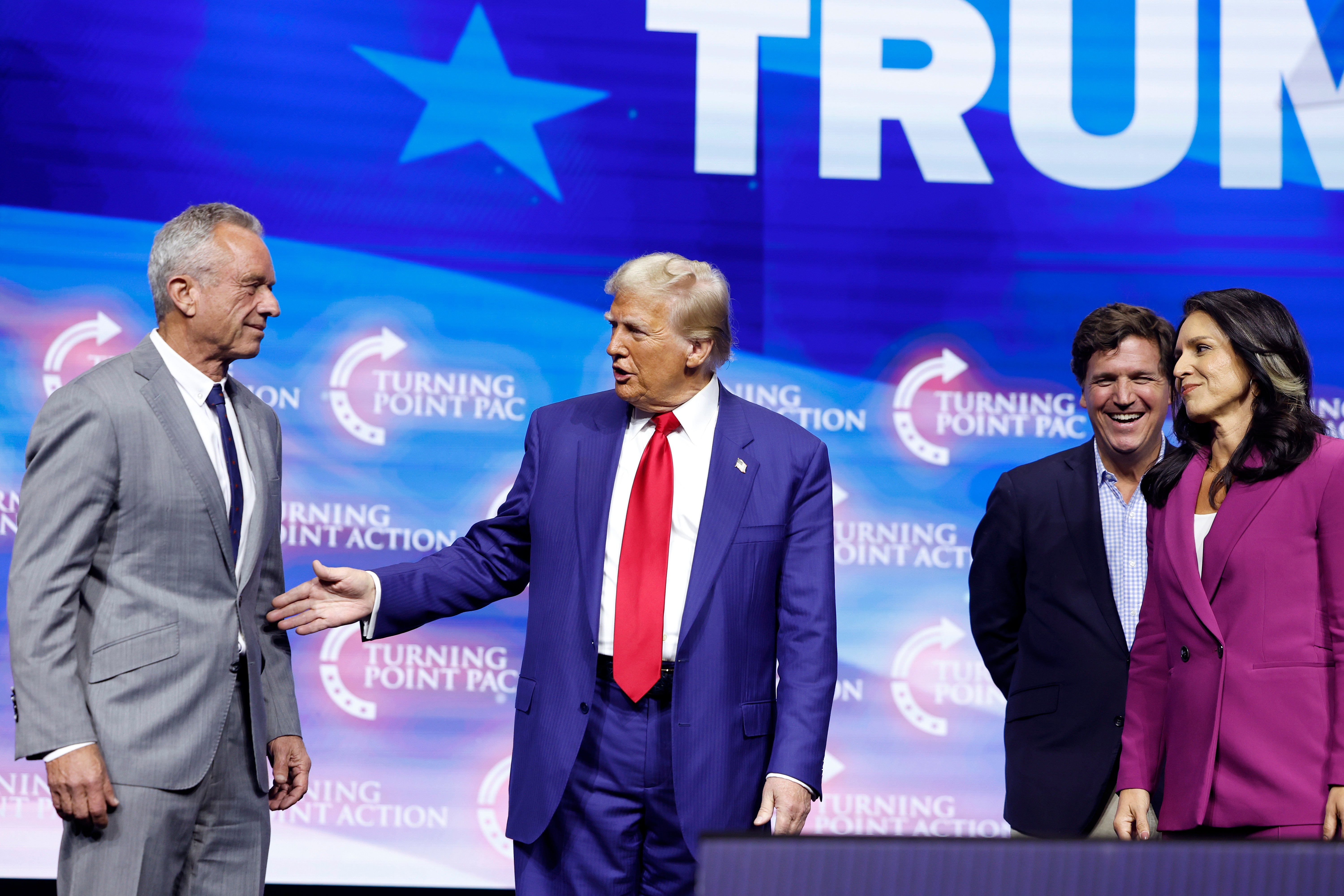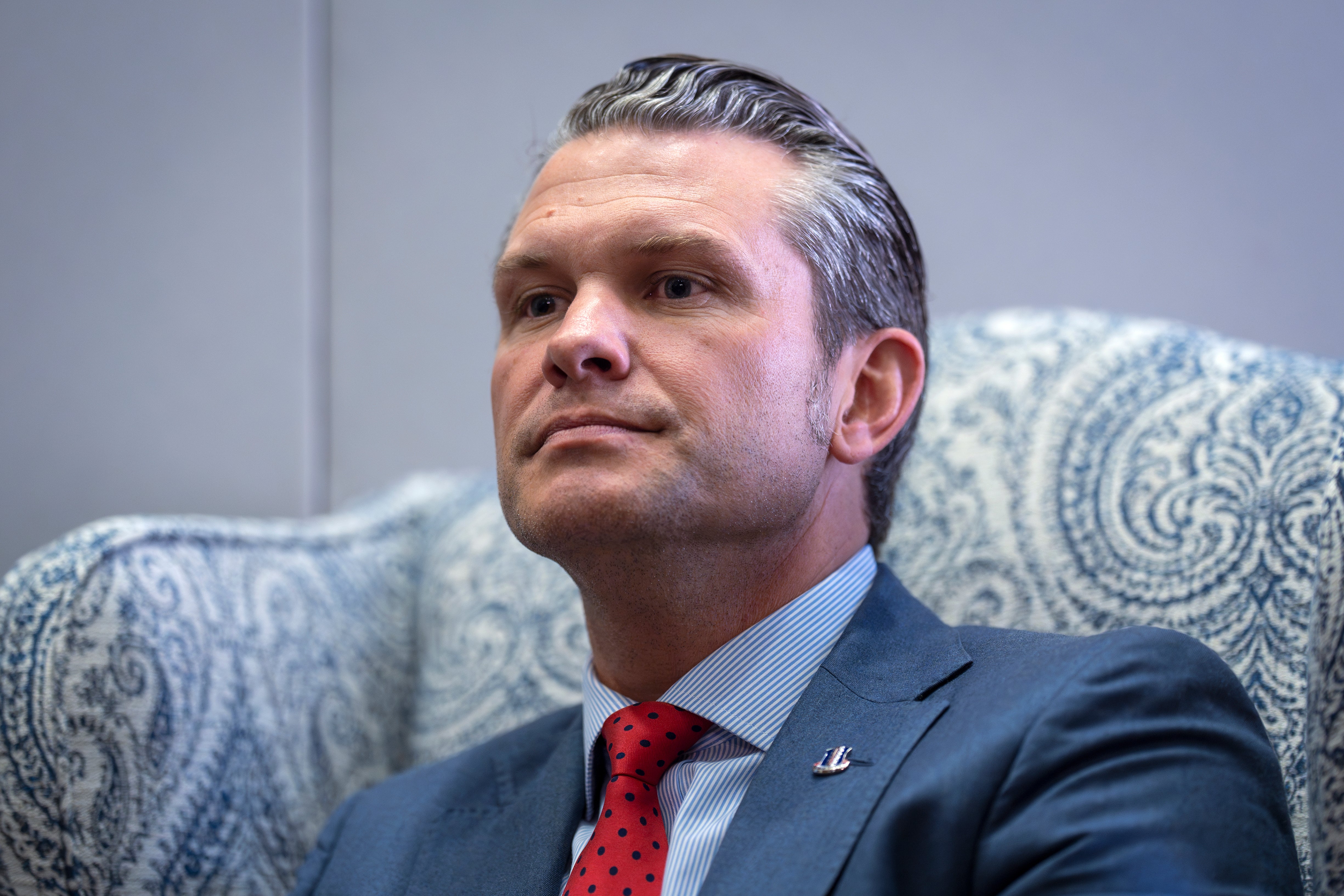Trump has two years to cause real chaos and harm and only these people will be able to stop him
The American system is known for its checks and balances so even the most powerful president doesn’t have absolute control, but looking at Trump’s appointments as well as plans like Project 2025, Alex Hannaford asks who, if anyone, can stop him from wreaking serious havoc in his second term?

After he was elected president of the United States for the second time in November, Donald Trump’s announcements of his nominees to head-up his various government departments have caused more than a few eye rolls across America. And with just a few weeks to go, people are bracing themselves for the potential chaos the new personnel could bring.
There’s Pete Hegseth, a former Fox News personality who CBS News points out is “facing headwinds over allegations of sexual misconduct, financial mismanagement and alcohol abuse”. Robert F Kennedy (RFK) Jr, a scion of the famous political dynasty and Trump’s pick for secretary of health and human services, is a notorious vaccine sceptic and wants to remove fluoride from drinking water. Then there’s former Representative Tulsi Gabbard, who Trump wants as his director of national intelligence, but who faces scrutiny for a “fact-finding” visit she paid to Syria in 2017 to meet since-ousted dictator Bashar al-Assad.
Rachel Bitecofer, Democratic political strategist and author of Hit ‘Em Where It Hurts: How to Save Democracy by Beating Republicans at their Own Game, says Trump’s cabinet picks are a big indication as to the direction his four years in office.
“He’s picking all of the 15 cabinet heads on one thing only,” Bitecofer says. “And it’s not party loyalty. It’s personal loyalty”, she says. “Other people who have done that went on to establish autocracies. And to those who say, ‘well, he can’t do that because that’s against the law,’ I’d say: have you not just watched Trump run roughshod over the rule of law and get away with it? We have a bias towards optimism in our human psychology, and we’re making a lot of assumptions that we’re going to still have the basic laws and constitutional system that we have now.”
Melissa Michelson, a political scientist at Menlo College in California, thinks Trump will be much more successful this time around at making the changes he wants to implement.
“Not only does he now have experience being president, which is a notable jump in his level of political experience, but he also has a blueprint he’s following,” she says. “And that’s Project 2025, prepared for him by the Heritage Foundation.” Project 2025, which Trump distanced himself from on the campaign trail, is a far-right plan that proposes a radical overhaul of the federal government, abolishing several departments, stifling dissenting voices, and implementing policies targeting immigrants, reproductive healthcare, and certain civil rights protections.
Michelson says Trump understands the importance of having his people in place and knows how to work the system. Like Bitecofer, she points out that political newcomers like Hegseth are being brought in mostly because of their loyalty, not necessarily because they have the relevant experience. “And I think those kinds of appointments are going to be the folks he is much more able to control,” she says.
There are a number of other nominations that concern her, such as Mehmet Oz, once known as “America’s Doctor”. Oz is Trump’s pick to head up federal health insurance programs Medicare and Medicaid, but is known for his promotion of supplements and herbs for which there’s little or no scientific evidence.

“In terms of what’s going to affect people’s lives, I think one of the ones most concerning is RFK Jr.” Michelson says. “By putting him in charge of health, given how that might impact policies designed to keep us healthy. We’re seeing daily reports of the spread of bird flu, of problems with contaminated food. What is RFK Jr going to do to protect the food supply and to respond to the next big health crisis, considering what we know about him?” she asks.
She thinks other nominations are more plausible. “I would contrast Marco Rubio with Pete Hegseth,” she says, referring to the Florida senator Trump has tapped for secretary of state. “Rubio has decades of experience in public service, has served on committees, knows a lot about the job, and is going to be more likely to have preconceived notions of what are the best ways to get things done and what are the best things to try to get done.”
Rubio is also someone who would be seen as credible on the international stage, says Stephen Farnsworth, professor of political science and international affairs at the University of Mary Washington in Virginia. “I’d make the same argument about the treasury secretary designate [hedge fund manager Scott Bessent] who is somebody with a long career in Wall Street, somebody who has been very, very successful in business and economics, and somebody who would be seen as very credible in the financial community. So when you’re looking at Trump’s picks, they’re not all monochromatic, blind loyalists.”
Farnsworth adds that from the point of view of a functioning democracy, it’s important to note that when Trump suggested that the Senate just adjourn and let him appoint everybody without hearings and background checks, the Republicans in the Senate declined. “The Senate has said that they will take their role as a co-equal branch seriously.”
America always wants change, and so Trump is likely to just have two years in the same way that Biden really only had two years
The problem with surrounding himself with acolytes, Farnsworth says, is that presidents get into trouble when they don’t have people around them who are providing their own best judgment. “And so,” he says, “Trump, in some ways, is setting himself up for a kind of risky environment.”
During the first Trump presidency, he says, the people around him had significant professional experience and credibility. “Think about the number of chiefs of staff, defence secretaries, secretaries of state, attorneys general and others that Trump went through – in part because they told him he couldn’t do something and he chafed at that. Trump’s background is not in the give and take of Congress. It’s not even in the give and take of a business where a CEO has to answer to a board of directors or to stockholders. His career has been in a private family business where the people who work for him are clearly underlings – and sometimes underlings and children at the same time.”
Farnsworth says that in reality, Trump probably has two years to implement his agenda. “Presidents usually get hammered in the midterms, no matter how well or how poorly they’ve done,” he says. “America always wants change, and so Trump is likely to just have two years in the same way that Biden really only had two years.”

Farnsworth’s prediction is that despite Trump’s announcement that he will deport millions of undocumented immigrants, it’s something that would be incredibly difficult to implement.
“When you think about the capacity of the federal government to adjudicate and house and locate people by the millions, that’s a pretty demanding thing for a government that struggles to just deliver the mail sometimes,” he says.
In addition, because America has elections every two years, he thinks members of the House of Representatives and Senate who will be facing the voters again in 2026 are going to pay a great deal of attention to their own self-preservation.
“If Trump wants to go too far down the road of tariffs, which could lead to a recession, there’s likely to be some pushback. And then there are people like Mitch McConnell who care a great deal about the authority of the Senate and who are not, in all likelihood, going to be facing voters again period, so he’ll likely not care that much about what Trump wants and take the longer view about the Senate’s role in the political system over time.”
And there are already signs of infighting too. Last week, the Maga movement became embroiled in a very public spat after Elon Musk and Vivek Ramaswamy, who Trump has selected to lead a new Department of Government Efficiency (DOGE), waded into a debate about H-1B visas, which allow US employers to temporarily recruit skilled foreign workers. In a lengthy post on X (Twitter), Ramaswamy argued that American tech companies needed those foreign workers because the country “venerated mediocrity over excellence”, while Musk liked a post that claimed Americans were too “retarded” to fill the job gap required by tech companies.
When an X user disagreed, Musk responded to him directly: “I will go to war on this issue the likes of which you cannot possibly comprehend,” he wrote. In response, Steve Bannon, who served as Trump’s chief strategist in his initial administration, took aim at Musk, writing: “Someone please notify ‘child protective services’ – need to do a ‘wellness check’ on this toddler.”
Michelson says she’s anticipating trouble coming from industry leaders too. “Mass deportations and massive tariffs will increase prices, will cause inflation, and will decrease the quality of life and the growth of the economy in the United States, and because that’s so true and so predictable, I think those policies will see some pushback from industry saying, look, we can’t return value to our shareholders. We can’t run our businesses if you take away all these workers.”
Trump, she points out, wants nothing more than to be seen as a strong businessman presiding over a strong economy. “Once it becomes clear to him that this isn’t what his friends and donors want and that it will have these negative consequences … he’ll have to find a way to roll this back.”
That, Michelson says, is her optimistic take. But optimism assumes the system will hold – that the checks and balances will still function as they were designed, and concerns from friends and donors won’t fall on deaf ears. What if, this time, they don’t?
Join our commenting forum
Join thought-provoking conversations, follow other Independent readers and see their replies
Comments

Bookmark popover
Removed from bookmarks